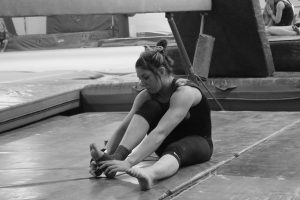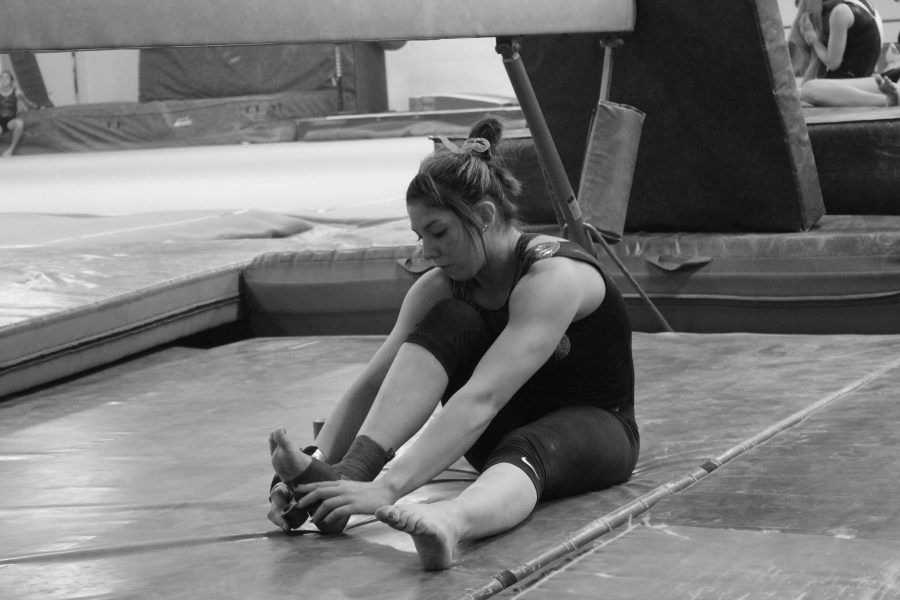About 25% of the world participates in gymnastics. Senior Aubrie Purtell almost vanished from that percentage. On June 23, 2011, Purtell’s hope of perfecting the balance beam came crashing down as she shattered every bone in her right foot. While attempting to land a backflip, Purtell came down too hard. Stunned by what had just happened, she didn’t feel the pain at first. She realized something was wrong when she noticed two bubbles had appeared on her foot.
She cried for less than 10 minutes after the accident. Purtell’s coach at the time told her to put her foot in a bucket of ice, and said that she would be okay. Later that day, the doctor told Purtell and her family that she would never participate in gymnastics again, and it was unlikely she would be to walk normally.
“It was one of the most distressing days of my life, finding out I would need six months of recovery and two surgeries. Even though the doctors told me how bad the condition my foot was in, I still tried walking on it the very next day,” said Purtell.
This isn’t how Purtell envisioned her gymnastics career would go. At the age of five, her mother had her join many sports to see which one she would be best at. Other sports didn’t come naturally to Purtell. In softball, she got a ball to the face. In soccer, she spent games picking dandelions on the sidelines. In ballet, she looked like a galloping horse. After one month of gymnastics, she had quit, but her mom signed her up again because she had too much energy.
Purtell became dedicated and developed a strong passion for gymnastics; she has been in love with the sport for the past 12 years. Her dedication to gymnastics is the reason she came back after her tragic injury to help coach the younger girls at the same gym she practiced at, the Crystal Lake Gymnastics Training Center.
While coaching, she noticed how much the younger girls looked up to the girls in higher levels of competition. It reminded her of how she looked up to Olympic gymnast Nastia Lukin, who is the 2005 and 2007 World Champion and an Olympic gold medalist. Purtell had the opportunity to meet Lukin a few times. Lukin wasn’t as nice as she had hoped, but she was still elegant and graceful. After coaching for six months, she decided to surpass everyone’s expectations while proving the doctors wrong. She began practicing again.
Purtell returned to gymnastics at level 9. Level 10 is the highest level, right under the elite level, also known as the Olympic level. For her first competition back, she only had the opportunity to participate in one event.
“Her first meet after the injury was pretty pathetic. She ended up landing on her face, but everyone cheered because it was such an accomplishment that she was able to come back,” said her mom, Jill Purtell.
This intense dedication resulted in Purtell practicing at least 20 hours a week with her current coach, Ben Hardy.

“The most important thing a gymnast should know is that success is built in the gym by doing the little things. It doesn’t matter how many times you fail, you just need to keep trying,” said Hardy.
Later on, in the year after the first competition, Purtell, along with five other competitors, qualified for Nationals. Purtell prepared for Nationals just like any regular competition, drinking a red bull and eating sour skittles before she competed. At the award ceremony, Purtell waited to hear her fate for the most intense competition she had ever participated in.
Purtell won the gold medal.
“It was amazing because it felt like everything paid off. All of a sudden, the hard work and countless amount of hours in the gym felt worth it,” said Purtell.
Once she was on top of the first place podium, she felt like she was on top of the world. An extra bonus was the feeling of satisfaction Purtell felt from knowing she had made her coach proud. The competition had been tense, with point differences among the top medalists being only one-tenth of a point apart.
“You have to be very careful with how you land. Just moving your foot the wrong way could be the difference between first and fourth place,” said Purtell.
With many competitions over the past 12 years, Purtell has amassed over 200 medals. Purtell now participates as a level 10 gymnast, and hopes to have the opportunity to compete in gymnastics in college. She would prefer to join the gymnastics team at the University of Illinois Chicago, but she’ll go anywhere that wants her.
In contrast, her mom wouldn’t mind if she quit gymnastics, even offering her $5,000 to quit because she doesn’t want her to get hurt.
“I love to see her proud when she achieves even the smallest accomplishment. One skill better than the day before is a win. I like the sport for her because it makes her happy, but I wouldn’t mind if she decided to quit because I lose more sleep than she does,” said Jill Purtell.
Gymnastics is one of the toughest sports because of the death-defying tasks. Currently, Purtell is proof of how grueling gymnastics is; she has a pulled hip flexor, a sprained ankle, arthritis in her right foot, and sprained wrists to demonstrate the fact.
“I don’t notice the pain any more because it is something I have gotten used to over the years,” said Purtell.

